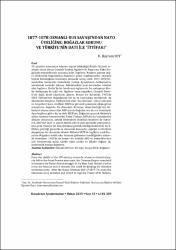| dc.contributor.author | Soy, H Bayram | |
| dc.date.accessioned | 2020-06-25T14:32:58Z | |
| dc.date.available | 2020-06-25T14:32:58Z | |
| dc.date.issued | 2015 | |
| dc.identifier.citation | Soy, H. B. (2015). 1877-1878 Osmanlı-Rus Savaşı'ndan Nato Üyeliğine: Boğazlar Sorunu Ve Türkiye'nin Batı İle "İttifakı". Karadeniz Araştırmaları, 12(45), 181 - 209. | en_US |
| dc.identifier.issn | 2536-5126 | |
| dc.identifier.issn | 2536-5126 | |
| dc.identifier.uri | https://app.trdizin.gov.tr/publication/paper/detail/TVRrMk16VTBOQT09 | |
| dc.identifier.uri | https://hdl.handle.net/20.500.12587/257 | |
| dc.description.abstract | 19. yüzyılın ortasından itibaren toprak bütünlüğü Büyük Güçlerin teminatı altına alınan Osmanlı Devleti, İngiltere ile Rusya'nın Yakın Doğu'daki mücadelesinin arasında kaldı. İngiltere, Rusların güneye doğru ilerleyerek Boğazlardan Akdeniz'e girme teşebbüslerine, Osmanlı toprak bütünlüğünü korumaya çalışarak cevap verdi. 1877-1878 Osmanlı-Rus Savaşı'nda Osmanlılar yenilip Ayastefanos Antlaşması'nı imzalamak zorunda kalınca, Balkanlardaki yeni durumdan rahatsız olan İngiltere, Berlin'de bir konferans toplayarak, bu antlaşmayı Berlin Antlaşması ile tadil etti. İngiltere bunu yaparken, Osmanlı Devleti'nin değil, kendi çıkarlarını gözetti. Benzer bir durumda, 1945'de SSCB Türkiye'den Boğazlardan bir üs ve kuzeydoğu sınırlarında da düzenleme isteyince, Türkiye'deki eski "Rus korkusu" tekrar canlandı ve Sovyetlere karşı özellikle ABD'nin güvenlik şemsiyesi altına girme arayışlarını doğurdu. Bu dönemde, Britanya İmparatorluğu'nun hâkimiyet alanını miras alan ABD için de Boğazlar son derece önemliydi. Aynı İngiltere gibi o da, bu defa SSCB'nin, Boğazları geçerek Akdeniz'e nüfuz etmesini istemeyecekti. Fakat Türkiye ABD'nin bu hassasiyetini dikkate almayarak, pekâlâ ödememesi mümkün bedelleri de ödeyerek, ABD'den malî ve askerî destek aldı ve onun güvenlik şemsiyesi altına girdi. Türkiye'nin Batı ittifakına girerek ödediği bedeller ile bu ittifakın getirdiği güvenlik ve ekonomik kazançlar, eşdeğer ve birbirini dengeleyen bir durumda olmadı. Hâlbuki 1878'de İngiltere nasıl Rusya'nın Boğazları tehdit eder konuma gelmesine kendiliğinden müsaade etmediyse, 1945'de de benzer bir tehdide ABD ve müttefiklerinin izin vermeyeceği açıktı. Çünkü siyasî şartlar ve ülkeler değişse de, jeostratejik konum değişmez | en_US |
| dc.description.abstract | From the middle of the 19th century onwards, whose territorial integrity left to the Great Powers assurance, the Ottoman Empire remained in between the Russo-British struggle in the Near East. Britain tried to resist the Russian march towards the south by keeping the Ottoman territorial unity. After the Russo-Ottoman War of 1877-78, when the Ottomans were defeated and forced to sign the Treaty of St. Stefano, the British being disturbed by the new situation in the Balkans, initiated a congress in Berlin and modified it by the Berlin Treaty. Britain in doing this, did not consider the interests of the Ottoman Empire, but her own. In a similar condition, in 1945 when the USSR demanded a base in the Straits and revision of the Turkish northeastern borders, since it arouse old "Russian fear" in Turkey, they resorted to the US. In this period, having inherited the British Empire's imperial mission, the Straits were also important for the US. Same as the British, the American would also not allow the Soviet Union crossing the Straits and penetrating to the Mediterranean. But Turkey did not recognize the US strategic vulnerability and by paying unnecessary prices, she got both economic and military aids from the US and bounded her to it. The prices paid for the security against the USSR to US are nonequivalent what Turkey gained from the US both military assistance and economic aid. However, how Britain did not allow the Russians to threaten the Straits in 1878 by herself, so would the US and her allies stop the USSR in the Straits in 1945 by themselves. Because, although the political conditions and states alters, geostrategic position does not change | en_US |
| dc.language.iso | tur | en_US |
| dc.rights | info:eu-repo/semantics/openAccess | en_US |
| dc.subject | Dil ve Dil Bilim | en_US |
| dc.title | 1877-1878 Osmanlı-Rus Savaşı'ndan Nato Üyeliğine: Boğazlar Sorunu Ve Türkiye'nin Batı İle "İttifakı" | en_US |
| dc.title.alternative | From the Ottoman- Russian War in 1877-1878 to the NATO Membership: The Straits Question and Turkey's "Alliance" with the West | en_US |
| dc.type | article | en_US |
| dc.contributor.department | Kırıkkale Üniversitesi | en_US |
| dc.identifier.volume | 12 | en_US |
| dc.identifier.issue | 45 | en_US |
| dc.identifier.startpage | 181 | en_US |
| dc.identifier.endpage | 209 | en_US |
| dc.relation.journal | Karadeniz Araştırmaları | en_US |
| dc.relation.publicationcategory | Makale - Ulusal Hakemli Dergi - Kurum Öğretim Elemanı | en_US |
















